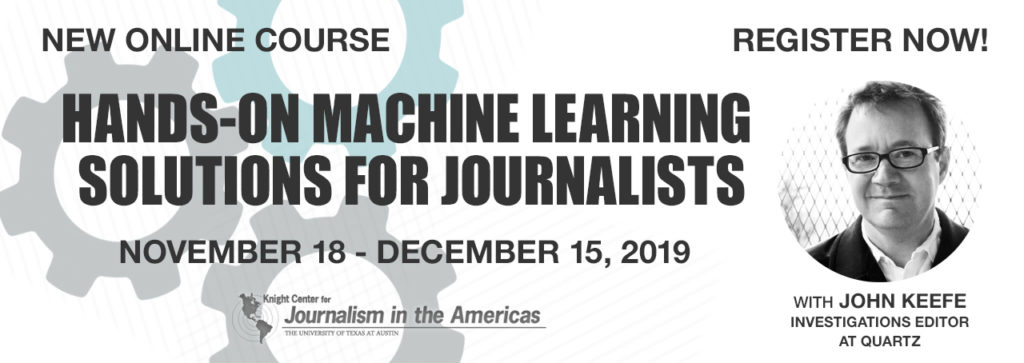
Have you ever felt overwhelmed by the sheer number of images or documents, or hours of video footage you needed to sort through for a report? Training a machine to do the work for you may be the answer.
Learn how artificial intelligence can improve your reporting with the new course from the Knight Center for Journalism in the Americas and instructor John Keefe, “Hands-on Machine Learning Solutions for Journalists.”
The four-week Big Online Course (BOC) runs from Nov. 18 to Dec. 15, 2019 and costs $95, which includes a certificate for those who successfully complete the course requirements. Register today!
“At the end of this class, students will have a much better understanding of machine learning. They will actually be able to sort documents, especially images, based on the criteria they set up,” said Keefe, who uses these techniques in his work as investigations editor at Quartz.
In this course, students will get hands-on experience with existing machine learning tools, learn how to get a machine to detect something particular in an image or a video, and begin to sort documents based on content.
“The takeaway for me is a better understanding about when AI might be useful for you because you’ve actually done it,” Keefe said.
Additionally, Keefe said this hands-on course will benefit journalists who report on machine learning and AI by helping them understand the mechanics behind the topic.
“Reporters and editors from around the world are eager to know more about the impact of AI and machine learning on their newsrooms. Many are taking baby steps in that direction. And they need help,” said professor Rosental C. Alves, Knight Center’s founder and director.
“We are lucky to count on John Keefe, one of the best experts in the United States right now in this area. He is bringing practical experience and I am sure students will learn a lot from him,” Alves said.
Keefe and his team at the Quartz AI Studio recently built a machine-learning model that reporters used to identify business plans, financial statements or tax returns among the 200,000 documents that were leaked to the International Consortium of Investigative Journalists (ICIJ) in what was known as the Mauritius Leaks, as explained by reporter Jeremy Merrill.
Thanks to machine learning, a group of 54 journalists from across the globe were able to investigate the role that the island nation Mauritius plays when companies doing business in Africa and beyond want to avoid paying taxes.
The time that it would’ve taken a human to complete the task was drastically reduced with the aid of artificial intelligence.
In addition to leading the Quartz AI Studio, Keefe teaches product prototyping, design and development at the Craig Newmark Graduate School of Journalism at CUNY. He also runs a product tinkering company called Really Good Smarts LLC. He previously worked as senior editor for data news and news director at public radio station WNYC. He is the author of “Family Projects for Smart Objects: Tabletop Projects That Respond to Your World.” This is the second course that Keefe has taught for the Knight Center. The first, “Building Bots for Journalism: Software You Talk With,” took place in 2018 and attracted more than 2,200 students.
This course will consist of video lectures, readings, participation in discussion forums and quizzes.
Students do not need experience with machine learning or coding to take the course, but will need a computer with an internet browser and an account on Google.
Like all Knight Center courses, this BOC will be asynchronous, meaning you can complete the activities at your own pace and time. However, there are recommended weekly deadlines so students don’t fall behind.
This BOC costs $95 and includes a certificate of completion for those who successfully watch all video lectures, review readings, pass quizzes and participate in the discussion forums. No formal course credit of any kind is associated with the certificate.
Unlike our MOOCs, which are open courses that normally attract a few thousand people and focus on more generic and introductory topics, BOCs are limited to a few hundred students and focus on more specific and advanced topics.
About the Knight Center
The Knight Center for Journalism in the Americas was created in 2002 by Professor Rosental Alves, Knight Chair of Journalism at the Moody College of Communication at the University of Texas, thanks to the generous donations of the John S. and James L. Knight Foundation. The Knight Center’s distance learning program began in 2003 and is funded in part by the Knight Foundation. Over the past six years, the Knight Center MOOCs have reached more than 193,000 people in 200 countries and territories.

Knight Center for Journalism in the Americas
300 West Dean Keeton
Room 3.212
Austin, TX, 78712
Phone: 512-471-1391
Email: journalismcourses@austin.utexas.edu